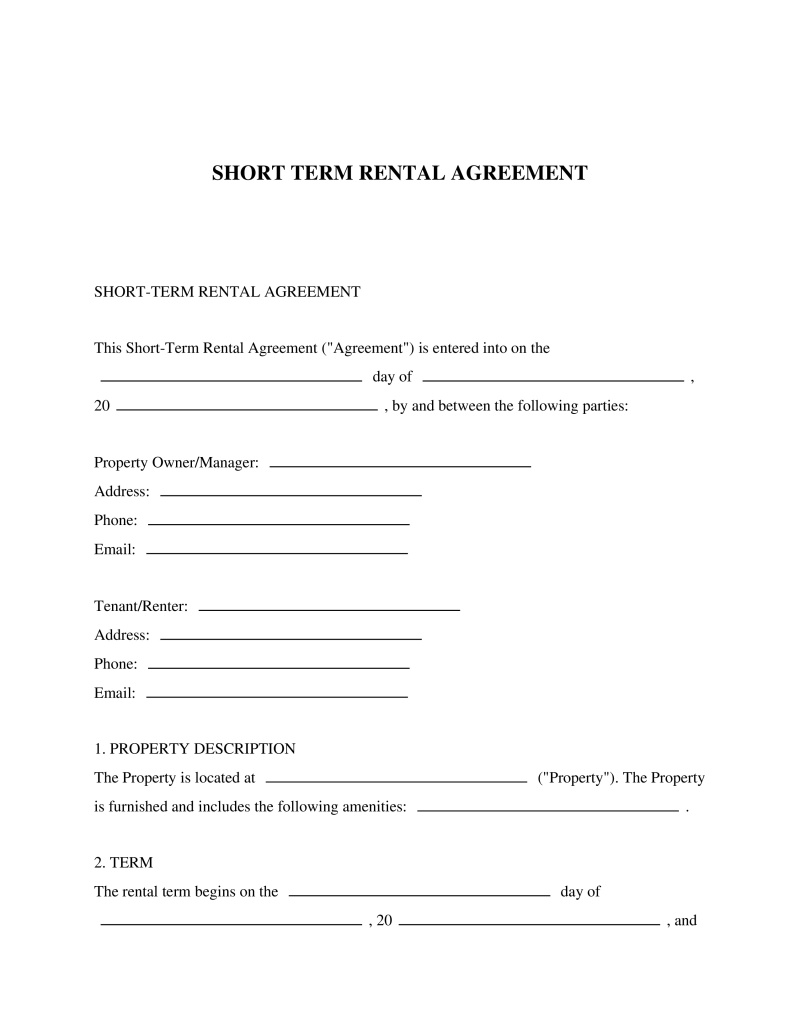A Short-Term Rental Agreement is a legally binding contract between a landlord and tenant, specifying terms for a temporary lease such as for vacation rentals.
Property Owner Name
Write the full legal name of the property owner as it appears on official documents. This could be an individual’s name (first and last) or a business name if the property is owned by a company. Accurate information is important, as it establishes legal ownership and can affect rights to the property.

Table of Contents
What is a Short-Term Rental Agreement?
A Short-Term Rental Agreement is a legally binding document designed to outline the terms and conditions between a property owner and a tenant for rental properties leased on a short-term basis. Typically, it applies to rentals ranging from a few days to several months, distinguishing it from longer lease agreements.
This document serves as a crucial tool for both landlords and tenants, providing clear expectations regarding rent, duration of stay, house rules, and other pertinent details. Landlords need this agreement to protect their property and ensure they are compensated for its use, while tenants benefit from understanding their rights and obligations during their stay. It is especially relevant in today's dynamic real estate market where short-term rentals are increasingly popular due to platforms like Airbnb and VRBO.
Key Features
Important Provisions
- Rental Term: Clearly defines the lease start date and end date.
- Payment Terms: Details payment amounts, due dates, late fees, and acceptable payment methods.
- Security Deposit: Outlines requirements for deposit amount, conditions for return, and allowable deductions.
- Maintenance and Repairs: Specifies responsibilities of landlord and tenant regarding property upkeep.
- House Rules: Establishes guidelines on behavior, including pet policies, smoking restrictions, and noise levels.
Pros and Cons
Pros
- +Minimizes legal disputes by clearly defining the rights and obligations of each party.
- +Enhances security for both landlord and tenant by outlining terms regarding deposits and payments.
- +Flexible duration terms cater to various rental needs, from vacation stays to temporary housing during relocation.
- +Facilitates easy resolution of maintenance issues through predefined responsibilities.
- +Streamlines the rental process with a comprehensive agreement that can be tailored to specific situations.
Cons
- -May require additional modifications or addendums to address unique circumstances not covered in the standard template.
- -Could potentially overlook local laws or regulations if not properly reviewed by a legal professional.
- -The necessity for thorough review and understanding by both parties can be time-consuming.
Common Uses
- Vacation rentals through platforms like Airbnb or VRBO.
- Short-term housing solutions for students during academic off-seasons.
- Temporary accommodation for professionals on work assignments or relocation.
- Event-specific lodging options, such as weddings or conferences.
- Emergency housing in response to natural disasters or unforeseen circumstances.
Frequently Asked Questions
Do you have a question about a Short-Term Rental Agreement?
Example questions:
Not the form you're looking for?
Try our legal document generator to create a custom document
Community Discussion
Share your experience and help others
Legal Notice: Comments are personal opinions and do not constitute legal advice. Always consult a qualified attorney for matters specific to your situation.
Comments (0)
Leave a Comment
No comments yet. Be the first to comment!